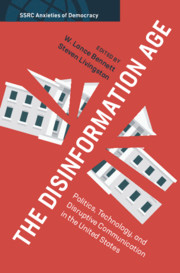Crossref Citations
This Book has been
cited by the following publications. This list is generated based on data provided by Crossref.
Haywood, Antoine
Aufderheide, Patricia
and
Sánchez Santos, Mariana
2021.
Community Media in a Pandemic: Facilitating Local Communication, Collective Resilience and Transitions to Virtual Public Life in the U.S..
Javnost - The Public,
Vol. 28,
Issue. 3,
p.
256.
Kreiss, Daniel
2021.
“Social Media and Democracy: The State of the Field, Prospects for Reform,” edited by Nathaniel Persily and Joshua A. Tucker.
The International Journal of Press/Politics,
Vol. 26,
Issue. 2,
p.
505.
Haywood, Antoine
Aufderheide, Patricia
and
Sanchez Santos, Mariana
2021.
Community Media in A Pandemic: Facilitating Local Communication, Collective Resilience and Transitions to Virtual Public Life in the U.S..
SSRN Electronic Journal,
Tarrow, Sidney
2021.
Movements and Parties.
Bontridder, Noémi
and
Poullet, Yves
2021.
The role of artificial intelligence in disinformation.
Data & Policy,
Vol. 3,
Issue. ,
Innes, Martin
Innes, Helen
Roberts, Colin
Harmston, Darren
and
Grinnell, Daniel
2021.
The normalisation and domestication of digital disinformation: on the alignment and consequences of far-right and Russian State (dis)information operations and campaigns in Europe.
Journal of Cyber Policy,
Vol. 6,
Issue. 1,
p.
31.
Berg, Sebastian
and
Hofmann, Jeanette
2021.
Digital democracy.
Internet Policy Review,
Vol. 10,
Issue. 4,
Starr, Paul
2021.
The Relational Public.
Sociological Theory,
Vol. 39,
Issue. 2,
p.
57.
Hughes, Brian
White, Kesa
West, Jennifer
Criezis, Meili
Zhou, Cindy
and
Bartholomew, Sarah
2021.
Cultural Variance in Reception and Interpretation of Social Media COVID-19 Disinformation in French-Speaking Regions.
International Journal of Environmental Research and Public Health,
Vol. 18,
Issue. 23,
p.
12624.
Bandy, Jack
and
Diakopoulos, Nicholas
2021.
Curating Quality? How Twitter’s Timeline Algorithm Treats Different Types of News.
Social Media + Society,
Vol. 7,
Issue. 3,
Bakir, Vian
and
McStay, Andrew
2022.
Optimising Emotions, Incubating Falsehoods.
p.
205.
Bakir, Vian
and
McStay, Andrew
2022.
Optimising Emotions, Incubating Falsehoods.
p.
139.
Santini, Rose Marie
Salles, Débora
and
Barros, Carlos Eduardo
2022.
We love to hate George Soros: A cross-platform analysis of the Globalism conspiracy theory campaign in Brazil.
Convergence: The International Journal of Research into New Media Technologies,
Vol. 28,
Issue. 4,
p.
983.
Rossette-Crake, Fiona
2022.
Digital Oratory as Discursive Practice.
p.
153.
Bakir, Vian
and
McStay, Andrew
2022.
Optimising Emotions, Incubating Falsehoods.
p.
29.
Hsiao, Yuan
and
Pfaff, Steven
2022.
Explaining the diffusion of radical ideas.
Sociology Compass,
Vol. 16,
Issue. 10,
Bélair-Gagnon, Valérie
Graves, Lucas
Kalsnes, Bente
Steensen, Steen
and
Westlund, Oscar
2022.
Considering Interinstitutional Visibilities in Combating Misinformation.
Digital Journalism,
Vol. 10,
Issue. 5,
p.
669.
Bakir, Vian
and
McStay, Andrew
2022.
Optimising Emotions, Incubating Falsehoods.
p.
53.
Bozdağ, Çiğdem
and
Koçer, Suncem
2022.
Skeptical Inertia in the Face of Polarization: News Consumption and Misinformation in Turkey.
Media and Communication,
Vol. 10,
Issue. 2,
p.
169.
Bakir, Vian
and
McStay, Andrew
2022.
Optimising Emotions, Incubating Falsehoods.
p.
103.



